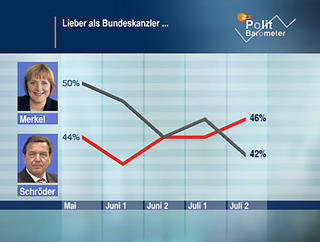We've had a four-party system since the 1980's," Richard Hilmer, managing director of Infratest dimap, a leading polling organization, said in an interview. He meant that for a quarter-century, power has generally alternated between a stable two-party moderate-right coalition and a two-party moderate left one, the current one in power being what is called the Red-Green coalition, between Mr. Schröder's Social Democrats and the Greens."But a five-party system makes things much more complicated than they were before," Mr. Hilmer said. Indeed, without the Left Party, it has seemed almost a certainty that a right-of-center coalition between the Christian Democratic Union, or C.D.U., led by Angela Merkel, and the small Free Democratic Party would win the September elections and form a government with Mrs. Merkel as chancellor, which is still a strong possibility. Still, pollsters like Mr. Hilmer say there is a 50-50 chance that the center-right alliance will not get a majority. If that should happen, Mrs. Merkel could be forced to enter into what is being called a "grand coalition" with the very Social Democrats she has been battling for two years.
Ou isto:
Last week, the talk in Germany was of a grand coalition which would put the parties of Angela Merkel and Gerhard Schroeder into a single government, likely with Merkel as its chancellor and Schroeder's SPD as junior partner. But this week, the media and chattering classes are speculating about a possible "Red-Red-Green" coalition that would put the SPD, Left Party and Greens under a single roof. As improbable as the "Red-Red-Green" coalition may be, just the talk of it puts the fear of God in Social and Christian Democratic leaders.The speculation isn't entirely unfounded. As unpalatable as it may be, the latest public opinion polls suggest a scenario in which neither the Social Democrats and Greens nor the Christian Democrats and neoliberal Free Democratic Party (FDP) would garner enough votes to form majority coalitions.The largest single percentage of German voters, 42 percent, say they would prefer a grand coalition to a fraying patchwork quilt of pseudo socialist parties with a lot of historical baggage and diverging political interests.
Pois é. Numa sondagem do dia 18 de Junho (TNS Emnid), a coligação PDS/WASG tinha 9%. Na última sondagem do mesmo instituto (19 de Julho) já tem12%, tendo vindo a subir sistematicamente.
E como se isto não chegasse, temos também que:

Sem comentários:
Enviar um comentário